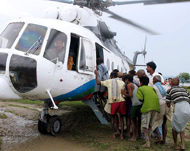Nepal rebels call for early elections
Nepal’s Maoist rebels have threatened to launch widespread street protests to press the multiparty government for early elections that would draw up a new constitution.

Speaking after a central committee meeting for the Communist party of Nepal, Krishna Bahadur Mahara, a rebel spokesman, said: “The government is lingering. We cannot continue to remain in limbo like this.”
One of the key rebel demands to end their revolt has been that the multiparty government oversee the constituent assembly elections, but rebels complain that the government is moving too slowly.
Mahara said: “These are the key political issues that need to be settled at the highest level between us and the seven-party government.
“If there is progress in a reasonable time of 10 or 15 days, it’s okay. Otherwise we will go to the people and launch peaceful street protests to achieve what the people want.”
Democratic Nepal
King Gyanendra was forced to end his absolute rule and restore democracy after violent street protests – organised by seven political parties – swept through the Nepalese capital of Kathmandu in April this year.
 |
|
Government officials agreed to |
The Maoists party entered into mainstream politics in June when they agreed to a power-sharing deal with the government which formed an interim legislature to replace the existing parliament.
The rebels want the monarchy abolished before constituent elections, while the government says the king’s fate should be decided by the elected assembly.
Mahara said: “We have formed a 10-member team headed by party chairman Prachanda to negotiate these subjects with top party leaders and the government.”
Truce
The new government and rebels agreed to confine their respective armies and weapons to temporary camps and barracks under UN supervision in July. The arrangement does not include the 100,000 Maoist fighters and their small arms.
Many analysts believe that the rebels are trying to divert attention from the arms issue ahead of the vote expected to be held next year.
Prateek Pradhan, editor of the daily Kathmandu Post, said: “They know if they lay down arms they will lose the elections. So they don’t want to leave their weapons.”
Call for aid
Nepal’s economy has suffered for at least a decade with tourists being deterred by the violence, giving the recent flooding and displacement of thousands of people an even bigger impact.
At least 50 people died and thousands were displaced in flash floods and landslides which were triggered by monsoon rains in the past week.
 |
|
Nepalese villagers are evacuated |
Matthew Kahane, the UN humanitarian co-ordinator for Nepal, said in a statement issued late on Friday: “People urgently need basic shelter, food, clothes, water and medicines.”
Nepalese media reports say that at least 1,500 flood victims are ill, mainly in the western plains of Nepal, and the UN is worried that the country could face a humanitarian crisis.
Kahane has urged officials to step up monitoring for the outbreak of diseases such as diarrhoea, typhoid, viral hepatitis and malaria.